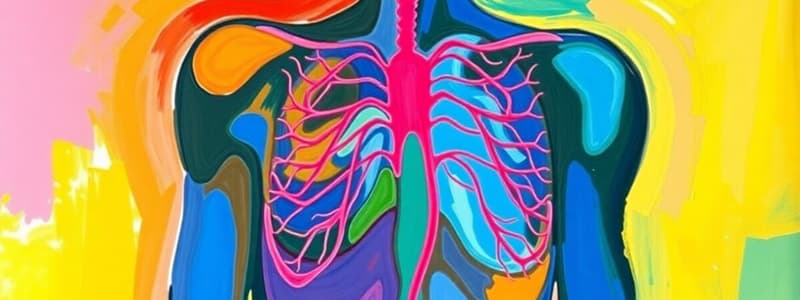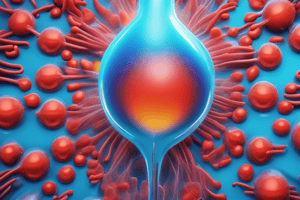Podcast
Questions and Answers
What is the primary role of the endocrine system in maintaining homeostasis?
What is the primary role of the endocrine system in maintaining homeostasis?
- To provide rapid, short-term responses using electrical signals.
- To regulate body temperature through direct nerve stimulation.
- To transport nutrients and oxygen to various body parts.
- To control body systems by producing and releasing hormones. (correct)
Which method primarily facilitates the endocrine system's control over bodily functions?
Which method primarily facilitates the endocrine system's control over bodily functions?
- Regulation through physical connections between organs.
- Secretion of chemical messengers into blood for transport. (correct)
- Release of neurotransmitters directly onto target cells.
- Direct transmission of electrical signals via neurons.
How does the endocrine system differ from the nervous system in controlling body functions?
How does the endocrine system differ from the nervous system in controlling body functions?
- The endocrine system acts quickly and has short-lived effects, while the nervous system is slower and has longer-lasting effects.
- The endocrine system influences body functions through hormones released into the bloodstream, while the nervous system uses direct nerve connections. (correct)
- The nervous system uses chemical signals, while the endocrine system uses electrical signals.
- The endocrine system is responsible for conscious control of body functions while the nervous system is responsible for unconscious functions.
What is a key concept in understanding how hormones interact with their target cells?
What is a key concept in understanding how hormones interact with their target cells?
In what way do hormones typically travel within the body to reach their target cells?
In what way do hormones typically travel within the body to reach their target cells?
Which of these is a primary function of the endocrine system?
Which of these is a primary function of the endocrine system?
Which best describes the type of tissue found in endocrine glands?
Which best describes the type of tissue found in endocrine glands?
What is the role of a 'second messenger' in hormone action?
What is the role of a 'second messenger' in hormone action?
Which of these options best describes synergistic hormonal interaction?
Which of these options best describes synergistic hormonal interaction?
The hypothalamus communicates with the anterior pituitary using which mechanism?
The hypothalamus communicates with the anterior pituitary using which mechanism?
What is the primary function of antidiuretic hormone (ADH)?
What is the primary function of antidiuretic hormone (ADH)?
Which of the following is a releasing hormone from the hypothalamus?
Which of the following is a releasing hormone from the hypothalamus?
What is the effect of growth hormone (GH) on glycogenolysis?
What is the effect of growth hormone (GH) on glycogenolysis?
Which cells within the thyroid gland secrete calcitonin?
Which cells within the thyroid gland secrete calcitonin?
How does thyroid hormone (TH) affect the body's metabolic rate?
How does thyroid hormone (TH) affect the body's metabolic rate?
What is the primary cause of a goiter?
What is the primary cause of a goiter?
Which hormone is released by the adrenal medulla?
Which hormone is released by the adrenal medulla?
What is the function of mineralocorticoids?
What is the function of mineralocorticoids?
How does cortisol affect blood glucose levels?
How does cortisol affect blood glucose levels?
What type of hormone is prostaglandin?
What type of hormone is prostaglandin?
Flashcards
Endocrine vs Nervous System
Endocrine vs Nervous System
The endocrine system uses hormones for slow but long-lasting control, while the nervous system uses electrical signals for rapid but short-lived responses.
Categories of Hormones
Categories of Hormones
Hormones can be classified into steroid hormones, peptide hormones, and amine hormones, each with different functions and structures.
Hormone Transport in Blood
Hormone Transport in Blood
Hormones are transported in the bloodstream, either freely or bound to carrier proteins, to reach target cells.
Hormone Interaction with Cells
Hormone Interaction with Cells
Signup and view all the flashcards
Homeostasis and Endocrine Control
Homeostasis and Endocrine Control
Signup and view all the flashcards
Endocrine System
Endocrine System
Signup and view all the flashcards
Hormones
Hormones
Signup and view all the flashcards
Target Cells
Target Cells
Signup and view all the flashcards
Hormonal Stimulation
Hormonal Stimulation
Signup and view all the flashcards
Water-Soluble Hormones
Water-Soluble Hormones
Signup and view all the flashcards
Lipid-Soluble Hormones
Lipid-Soluble Hormones
Signup and view all the flashcards
Thyroid Hormones
Thyroid Hormones
Signup and view all the flashcards
Calcitonin
Calcitonin
Signup and view all the flashcards
Glucagon
Glucagon
Signup and view all the flashcards
Insulin
Insulin
Signup and view all the flashcards
Adrenal Glands
Adrenal Glands
Signup and view all the flashcards
Growth Hormone
Growth Hormone
Signup and view all the flashcards
Cushing syndrome
Cushing syndrome
Signup and view all the flashcards
Homeostasis
Homeostasis
Signup and view all the flashcards
Study Notes
Endocrine System Lecture Outline
- The endocrine system controls body functions.
- It uses hormones to regulate various processes.
- It differs from the nervous system in that actions are slower and longer lasting.
Overview of the Endocrine System
- The endocrine system is made up of ductless glands.
- Hormones are released into the blood.
- Target cells have specific receptors, binding and responding to the hormone.
- Hormones travel to target cells through the blood and interstitial fluid.
Comparison of Endocrine and Nervous Systems
- Both systems use ligands (chemical messengers).
- The endocrine system releases hormones into the blood, reaching targets throughout the body.
- The nervous system directly targets specific cells.
- Endocrine responses have longer reaction times and effects.
General Functions of the Endocrine System
- Regulates development, growth, and metabolism.
- Maintains homeostasis (blood composition and volume).
- Influences digestive processes.
Types of Circulating Hormones
- Steroids:
- Lipid-soluble, derived from cholesterol.
- Includes gonadal steroids and adrenal cortex steroids.
- Biogenic Amines:
- Modified amino acids.
- Includes catecholamines and thyroid hormone.
- Proteins:
- Water-soluble, amino acid chains.
Local Hormones
- Signaling molecules that don't circulate in the blood.
Stimulation of Hormone Synthesis and Release
- Hormone release is regulated by hormonal, humoral, and nervous stimuli.
- Hormonal stimulation: Another hormone triggers a gland cell to release hormones.
- Humoral stimulation: Hormone release is induced by changes in blood levels of ions or nutrients.
- Nervous system stimulation: A neuronal signal directly triggers hormone release.
Hormone Interactions
- Hormones can interact with each other.
- Synergistic interactions: Hormones work together, amplifying effectiveness.
- Permissive interactions: One hormone is required for another's action.
- Antagonistic interactions: Hormones have opposing actions.
Relationship of Hypothalamus and Pituitary Gland
- The hypothalamus controls the pituitary gland, which controls other endocrine organs.
- The pituitary is divided into anterior and posterior lobes.
- The posterior pituitary stores and releases hormones made by the hypothalamus.
- The anterior pituitary releases hormones regulated by hypothalamic hormones.
Anterior Pituitary Hormones
- Thyroid-stimulating hormone (TSH): Stimulates the thyroid gland.
- Prolactin (PRL): Promotes milk production.
- Adrenocorticotropic hormone (ACTH): Stimulates the adrenal cortex.
- Gonadotrophins (FSH and LH): Regulate reproductive function.
- Growth hormone (GH): Stimulates growth.
Growth Hormone Regulation
- Releasing and inhibiting hormones from the hypothalamus regulate GH release.
- Factors like age, nutrients, stress, and exercise affect GHRH and GHIH release.
Thyroid Hormone Regulation
- The hypothalamic-pituitary-thyroid axis controls thyroid hormone release.
- TSH stimulates the thyroid to release T3 and T4.
- These hormones regulate metabolism.
Effects of Thyroid Hormone
- Affects cellular transport, metabolism, and body temperature.
Regulation and Effects of Cortisol
- The hypothalamic-pituitary-adrenal axis regulates cortisol release.
- Cortisol affects blood glucose, metabolism, and response to stress.
Anatomy of the Pancreas
- Pancreas has endocrine and exocrine functions.
- Endocrine cells (islets of Langerhans) secrete hormones.
- Alpha cells: Secrete glucagon.
- Beta cells: Secrete insulin.
Pancreatic Hormones
- Insulin: Lowers blood glucose.
- Glucagon: Increases blood glucose.
Diabetes Mellitus
- Group of metabolic disorders characterized by hyperglycemia.
- Insufficient insulin production or ineffective insulin action.
- Chronic elevation of blood glucose damages various tissues.
Pineal Gland
- Located in the diencephalon.
- Produces melatonin, regulating circadian rhythm
Studying That Suits You
Use AI to generate personalized quizzes and flashcards to suit your learning preferences.




